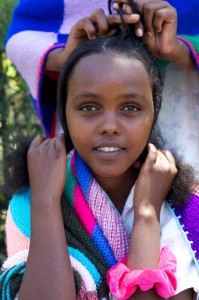Her name is Addiss and she is 21 years old.
She lives in a small village, Wotetabay, just outside of BahirDar, Ethiopia and she has dedicated the next six years of her life to helping rural Ethiopian women give birth to healthy babies. A recent graduate of Hamlin College of Midwives, she also knows the signs of fistula and will refer at-risk women to health centers and hospitals where they can receive the care they need to prevent this devastating condition.
She lives alone in a small thatch roof hut, after completing her three years of study at the Hamlin College of Midwives, and her dedication is unlike anything I have ever seen.
She sees patients as they arrive daily, helping them through miscarriages and difficult births and general health care issues. Five times a month she walks, sometimes for seven hours each day, to outreach health centers where she educates the community on women’s health issues.
My heart reaches for her.
I watch her as she helps a women who has just had a miscarriage. She educates the women about hygiene and proper care, and she tends to the husband, answering each of his questions.
She thinks nothing of my words as I say I honor her and will work hard on her behalf. This is simply her calling in life: to dedicate her time to the Hamlin philosophy of ensuring maternal health for all Ethiopian women. She looks intently, directly, into my eyes. She has seen far more than I have.
I follow her to her outpost, walking through corn fields and forests and open fields. She asks for water, and I give her my bottle. It is the least I can do for this girl, my hero. Confidently and with grace, she proceeds to traverse over harsh landscape, focused on arriving before too much time has passed.
The bush clears, and I see a large group of Ethiopians, celebrating church services. Addiss takes her place in the middle of the village people crowd, and when the priest gives her a signal, she begins speaking, educating those around her about maternal health. Clapping, cheering, declarations of promises break out, and the energy is so fervent, I cry. Look at her!
I hear that the village is building a new church, and I give a donation of 400 birr ($24) and the crowd cheers with heartfelt passion. A $24 donation really goes a long way for this village. They proceed to show me the base infrastructure that is in place, and as much as would like to stay and look at every element, and I see Addiss in the distance beckoning me to come. She is late now, and I need to move on.
We walk further, in terrain more difficult to navigate. Finally, I see a break in the landscape ahead and there, nestled in a small field, is a cluster of small mud walled structures. The health outpost at last.
Women are lined up, having waited hours for Addiss to arrive. Pregnant women, mothers with babies, older women. They count on Addiss’ dedication to them.






















































